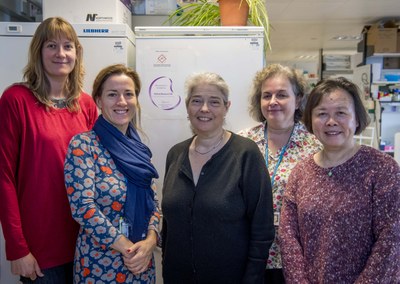J Karttunen, SE Stewart, L Kalmar, AJ Grant, FE Karet Frankl and TL Williams. Size-Exclusion Chromatography Separation Reveals That Vesicular and Non-Vesicular Small RNA Profiles Differ in Cell-Free Urine. Int J Mol Sci 22:4881, doi: 10.3390/ijms22094881, 2021
ND Palmer, FE Karet Frankl, E Kruzel-Davila & BI Freedman. Genetics and Chronic Kidney Disease. in: Chronic Renal Disease (2nd Edition). Ed. PL Kimmel & MD Rosenberg, Elsevier, ISBN 978-0-12-815876-0, 2020
R El-Damanawi, M Lee, T Harris, LB Cowley, S Bond, H Pavey, RN Sandford, IB Wilkinson, FE Karet Frankl & TF Hiemstra. High Water versus Ad libitum Water Intake for Autosomal Dominant Polycystic Kidney Disease: A Randomised Controlled Feasibility Trial. QJM doi: 10.1093/qjmed/hcz326, 2020
TL Williams, C Bastos, N Faria & FE Karet Frankl. Making urinary extracellular vesicles a clinically tractable source of biomarkers for inherited tubulopathies using a small volume precipitation method: proof of concept. J Nephrol. doi: 10.1007/s40620-019-00653-8, 2019
Day C, Søpstad S, Ma H, Jiang C, Nathan A, Elliott SR, Karet Frankl FE & Hutter TF. Impedance-based sensor for potassium ions. Analytica Chimica Acta 1034:39-45, 2018
El-Damanawi R, Lee M, Harris T, Mader L, Bond S, Pavey H, Sandford RN, Wilkinson IB, Woznowski P, Ben-Shlomo Y, Karet Frankl FE & Hiemstra TF.A Randomised Controlled Trial of High versus Ad Libitum Water Intake in Patients with Autosomal Dominant Polycystic Kidney Disease: Rationale and Design of the DRINK Feasibility Trial. BMJ Open 8:e022859. doi:10.1136/ bmjopen-2018-022859, 2018
Gracia TR, Wang X, Su Y, Norgett EE, Williams TL, Moreno P, Micklem G & Karet Frankl FE. Urinary exosomes contain microRNAs capable of paracrine modulation of tubular transporters. Sci. Rep. 7:40601, 2017
Su Y, Hiemstra TF, Yan Y, Li J, Karet HI, Rosen L, Moreno P and Karet Frankl FE. PDLIM5 links kidney anion exchanger 1 (AE1) to ILK and is required for membrane targeting of kAE1. Sci. Rep. 7:39701, 2017
A Blanchard, D Bockenhauer, D Bolignano,LA Calò, E Cosyns, O Devuyst, DH Ellison, FE Karet Frankl, NVAM Knoers, M Konrad, S-H Lin, R Vargas-Poussou (all joint, listed alphabetically). Gitelman syndrome: Consensus and guidance from a Kidney Disease: Improving Global Outcomes (KDIGO) controversies conference. Kidney Int 91:24-33, 2017
C Robinson and FE Karet Frankl. Magnesium Lactate in the Treatment of Gitelman Syndrome – Patient Reported Outcomes. Nephrol. Dialysis Transplant 32:508-512, 2017
FE Karet Frankl. The importance of being rare. Lancet 388:632, 2016



